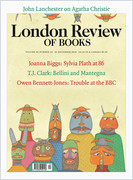The Case of Agatha Christie
Her great talent for fictional murder is to do with her understanding of, and complete belief in, human malignity. She knew that people could hate each other, and act on their hate. Her plots are complicated, designedly so, and the backstories and red herrings involved are often ornate, but in the end, the reason one person murders another in her work comes down to avarice and/or hate. She believed in evil, not necessarily in a theological sense – that’s a topic she doesn’t explore – but as a plain fact about human beings and their actions. She isn’t much interested in the ethics or metaphysics of why people do the bad things they do. But she is unflinchingly willing to look directly at the truth that they do them. More
Trouble at the BBC
I have never believed the claim that the BBC is independent of government influence since conducting an interview with the then foreign secretary Jack Straw in 2004. Our interaction came at a moment when there was a slight difference in the line being taken by the Foreign Office and Number Ten about the various inquiries into Iraq – exactly the sort of thing BBC journalists were paid to niggle away at. When I kept going on about it, Straw eventually lost his temper and swore on tape. Scoop! The difficulty was that the Foreign Office funded the World Service. As I left King Charles Street, I called the BBC to say I had a story. By the time I got back to the office, a manager had already called FCO officials to apologise. More
Bellini and Mantegna
I believe that both Mantegna and Bellini were alert to every difficult turn and rebalancing in Luke’s verses, and thought hard as they painted about how to convert such turns into touches, faces, ways of looking and holding, intervals between people, ‘drapery’ (a word whose matter-of-factness conceals, in the greatest artists, metaphor after metaphor of human strangeness), proximity, ‘expression’. Ruskin, in his pages on Bellini, goes on to assert that ‘the third attribute of the best art’ – the first two are consistency of workmanship and perfect serenity – ‘is that it compels you to think of the spirit of the creature, and therefore of its face, more than of its body’. The ‘more than’ here strikes me as wrong: as much is conveyed by Mary and Simeon’s hands and arms, or the set of necks on shoulders, as by their mouths and eyes. But the faces are triumphs – Ruskin is right. In them, but also in the whole play of bodily acceptance and withholding, everything Luke’s words suggest is made manifest. More
Sylvia Plath at 86
Plath grows up in Cold War America, deceived by a God who let her father die, wanting more than anything to be a writer and to marry a man who would make her feel like she had a vodka sword in her stomach, always. And she gets it when she arrives in Cambridge in 1956, meets her black marauder and marries him ‘in mother’s gift of a pink knit dress’ three and a half months later. But the world, even when it gives her what she wants, also doesn’t. Literary success is baseless, fleeting; the marriage dissolves in betrayal, arguments, abandonment. The hard work has come to ash. Awake at 4 a.m. when the sleeping pills wear off, she finds a voice and writes the poems of her life, ones that will make her a myth like Lazarus, like Lorelei. But now she knows that her conception of her life, psychological and otherwise, is no longer tenable, and never was. Now what? ‘I love you for listening,’ Plath, abandoned and alone, tells her analyst Ruth Beuscher in a letter late in 1962. The rest of us are listening at last. More
LATEST AUDIO AND VIDEO
VIDEO 'Russia without Putin'
Tony Wood considers the state of Russia with James Meek. Watch »
AUDIO For England and St George
Listen to James Meek’s essay on Brexit and myths of Englishness. Listen »






